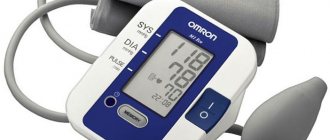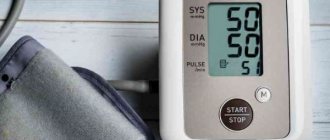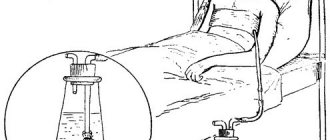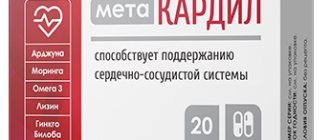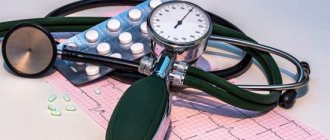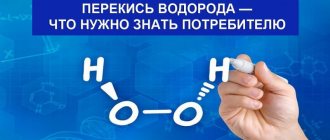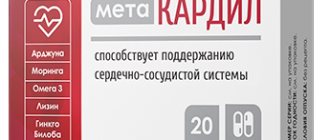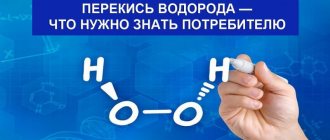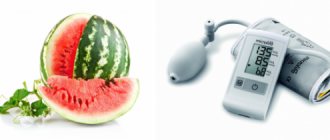Blood pressure reflects the internal state of a person. Its indicators can change significantly under the influence of certain extraneous factors. High blood pressure can pose a serious risk to human health. It can increase in the presence of various diseases. That is why if your blood pressure regularly increases, you should immediately consult a doctor. If this recommendation is not followed, the condition may worsen significantly and result in serious deviations. Treatment should also be supervised by a medical professional.
High blood pressure is a symptom of many diseases
What pressure is considered the most normal?
Normal blood pressure is 100-139 mm Hg. Art. If systolic pressure drops below 90 mm, hypotension occurs.
This condition is potentially not dangerous, but can create a strong feeling of discomfort. The most unpleasant thing about hypotension is a significant decrease in concentration. A person faced with such an illness will find it difficult to even read. If systolic pressure exceeds 140 mm, hypertension is recorded.
What are the symptoms of hypertension
High blood pressure can cause great harm to the human body. Often it indicates the presence of pathologies. This phenomenon occurs due to high vascular resistance. But this is only one of the possible options. Only an experienced doctor can give accurate information. It is important to take into account that the state of blood pressure can be influenced by overwork, the use of special medications, and the inclusion in the diet of food containing substances that affect blood pressure.
In medicine, there are several conditions of blood pressure:
- normal;
- high;
- hypertension 1 degree;
- hypertension 2 degrees;
- hypertension 3 degrees.
Note that grade 3 hypertension is registered when the level reaches 180/110 mmHg. Art. A large number of different studies have been conducted regarding arterial hypertension, but they have not been able to identify the exact causes of the development of hypertension.
VSD and sympathoadrenal crisis
A crisis is a dangerous condition for any pathology. With VSD, pressure jumps during a crisis to 200 units. The person is in a state of horror from the fear of death, suffers from headaches, shortness of breath and palpitations, feels extremely unwell, as if he is dying. After the attack ends, you usually feel the urge to go to the toilet, since high blood pressure causes the kidneys to work at an accelerated rate. A crisis can last several hours, most often it does not pose a direct threat to health.
It is important to differentiate between sympathoadrenal and hypertensive crises, since the second is truly life-threatening and usually occurs in hypertensive patients. In such a situation, you need to urgently call an ambulance and take blood pressure medications.
In contrast to this condition, sympathoadrenal crisis is relieved by psychotherapeutic methods.
Main signs of a panic attack:
- feelings of extreme fear;
- tachycardia;
- limbs become numb and cold;
- there is not enough air;
- the intestines and bladder tend to empty.
What reasons can cause high blood pressure
Medicine has established the most common causes that can cause high blood pressure in the human body. These include influencing factors such as drugs, diseases of the urinary system, endocrine diseases, aortic diseases, complications arising during pregnancy, problems with the nervous system.
Antidepressants and glucocorticosteroids (for example, prednisolone) can cause high blood pressure. Contraceptives can also have a negative impact. Risk factors that can lead to the development of hypertension include the following:
- Hereditary factors.
- Prematurity.
- A child's low weight may indicate a potential predisposition to high blood pressure.
- Large overweight.
- High salt content in food. The norm for table salt consumption is considered to be 5 grams per day.
- Drinking alcohol, smoking. Bad habits can worsen the condition of blood vessels and affect the circulatory system in the most detrimental way.
- Insufficient physical activity.
- Poor environment, daily stress, increased noise levels.
Of all these factors, it is necessary to focus a lot of attention on excess weight, bad habits, and severe stress. In most cases, these reasons increase the risk of hypertension.
Causes of hypertension
High blood pressure is caused by a number of factors. Moreover, a potential or chronic hypertensive patient can eliminate some of them from his life, thereby bringing blood pressure levels closer to normal. Causes of high blood pressure may include the following:
- Heredity.
- Excess salt in the diet (salty foods retain fluid in the body, which causes attacks of hypertension).
- Smoking (nicotine makes blood vessels fragile and deprives them of elasticity).
- Alcohol (alcohol causes a sharp increase in blood pressure, which can lead to a hypertensive crisis).
- Failure to comply with the drinking regime (people who drink a lot of liquid before bed are more likely to experience high blood pressure in the morning, accompanied by swelling).
- Stress (negative emotions cause the release of the hormone adrenaline).
- Physical inactivity (lack of physical activity: the most common cause of hypertension, as it impairs blood flow through the vessels).
- Obesity (excess weight disrupts lipid metabolism, increases the risk of diabetes and cardiovascular disorders).
- Decreased blood glucose concentration.
- Chronic diseases (endocrine, neurogenic, renal, cardiovascular).
- Taking certain medications.
A sudden increase in pressure can be caused by a change in climatic conditions, a change in weather
Gender also plays a role. Hypertension in men most often occurs after 40 years of age. Women traditionally encounter the disease after 50. This is due to the onset of menopause and hormonal changes in the body and increased fragility of blood vessels. Often, women first become acquainted with hypertension during pregnancy, when the load on the circulatory system of the expectant mother increases.
Advice! By eliminating pressure-increasing factors such as smoking, physical inactivity, and excess salt in the diet, you can stop the development of arterial hypertension at an early stage and practically without the use of medications.
What pressure is considered critical?
We noted that the highest pressure in the world was 310/220 mm Hg. Art. However, doctors say that 260/160 mm Hg is considered critical indicators. Art. Thus, the record blood pressure can be considered a phenomenon, because even at critical values the human body can die.
The occurrence of hypertension can lead to hypoxia, the greatest harm of which is the negative impact on the brain, which is actually deprived of oxygen. The problem with the brain lies in its seemingly unusually developed blood supply system. The vascular ring can work normally only at normal pressure values. Otherwise, tone regulation is disrupted, permeability increases, and then hypoxia may develop.
Myth: People live with hypertension for years and nothing happens.
This opinion, unfortunately, for many is reinforced by personal experience (which, as we know, is the “son of mistakes”). And, nevertheless, periodic or constant increase in blood pressure damages small arteries, causing disruption of the functioning of almost all organs. The “shell” that hypertension exposes to the brain, heart, eyes, and kidneys sooner or later leads to cerebral stroke, myocardial infarction, heart and kidney failure, retinal detachment and blindness. If nothing is done, complications are inevitable. A short-term “jump” in blood pressure causes the same disturbances as a long-term increase in blood pressure. Sharp fluctuations are even more dangerous: after all, the cells do not have time to rebuild in order to “extinguish” the sudden load.
What is the prevention of high blood pressure?
People who experience high blood pressure need to remember the need for regular checks. Often a person does not feel symptoms and does not suspect what danger blood pressure hides. Even with long-term hypertension, people ignore the condition, attributing everything to fatigue or overwork. It is important to understand that pressure increases when blood vessels narrow, when the heart has to work at “high speed.”
Foods containing large amounts of saturated fatty acids can lead to hypertension. The highest content of these substances is found in butter, cheeses, and sour cream. It is recommended to avoid products containing large amounts of palm oil. Cake, chocolate, cookies, fatty sausage, chips are all sources of saturated fatty acids. Of course, it is important to take into account physical activity; you need to eat exactly as much as the body needs to ensure normal functioning. Moreover, you need to take into account the composition of the products. Many manufacturers even indicate the percentage of EFA content per 100 grams.
The amount of salt consumed also needs to be reduced. Scientists have long noticed the effect it can have on the human body when consumed excessively. The biggest problem is that most foods sold on supermarket shelves contain quite a bit of salt. By using this additive in our diet, we expose our body to even more danger. For those who love salty foods, the best option to get rid of excess is physical activity. Salt can reduce the elasticity of blood vessels and negatively affect the kidneys and liver.
Hypertension and hypotension, low blood pressure, symptoms, diet, treatment
These diseases have a common pedigree and causes, a common prevention, but different consequences from the destructive action and completely opposite methods of treatment. What do you need to remember to avoid complications?
Causes of increased and decreased pressure
If the sympathetic centers of the autonomic nervous system are excited, the pressure rises, if the parasympathetic centers, the pressure drops. People in whom these departments function harmoniously have excellent health. But often the scales tip in one direction, and then a person becomes a candidate for either hypertensive or hypotensive patients. If the pathological process is started, the vessels are the first to suffer.
Symptoms of hypertension and hypotension
Hypertension does not show any symptoms for a long time. Many people do not even suspect that they are sick, and they first learn about it from an emergency doctor, when the disease has already had complications and a heart attack or stroke is just around the corner. It is no coincidence that hypertension is called the “silent killer”. Hypotension, compared to hypertension, seems like a harmless ailment. However, you won’t envy hypotensive people either. All their lives they live as if at half-heat. Waking up with difficulty, they feel exhausted and sleep-deprived even after a long sleep. They are often tormented by dizziness to the point of fainting, and physical exertion causes palpitations and shortness of breath. And although hypotension does not cause such severe consequences as hypertension, against its background serious disturbances in the functioning of various organs and systems of the body can still develop
It is very important to notice ill health in time and regularly monitor your blood pressure with a doctor or with a tonometer.
Risk factors for these diseases, in addition to heredity, gender and age, which we cannot change, include stress, physical inactivity, obesity, atherosclerosis, as well as smoking, alcohol and poor diet, that is, things that can be gotten rid of by adjusting your lifestyle. To do this, create a favorable psychological climate around yourself. Move more. Get enough sleep. Think over and diversify the menu.
Diet for hypertension
If you have hypertension, it is necessary to exclude from your diet sweet, fatty, flour products, animal fats, coffee, strong tea, and carbonated drinks with caffeine. Do not add salt to prepared foods. There is even a special form of hypertension - saline hypertension, the only cause of which is excess sodium intake. You can get rid of the disease by eliminating salt from your diet. Herbal medicine for hypertension includes chokeberry, hawthorn, hibiscus, motherwort pentaloba, viburnum, black cohosh, mistletoe, and Japanese sophora.
Diet for hypotension - low blood pressure
If you have hypotension, you can indulge in salted fish, cucumbers, mushrooms, sharp cheeses, and canned vegetables. In the first half of the day, strong coffee or tea will not hurt. In the morning, for vigor, you can drink a glass of water with 20 drops of tinctures of ginseng or Manchurian aralia. For hypotension, traditional medicine recommends the use of Schisandra chinensis, eleutherococcus, prickly tartar, skullcap, Rhodiola rosea, Eleven angustifolia, high thyme, and thyme. Persimmon is rich in substances that strengthen the cardiovascular system. It is recommended to drink 50-100 ml of thick juice daily.
Low blood pressure treatment
The healing power of aromatherapy for hypotension and hypertension
A morning bath with three drops of essential oil of rosemary, clove, leuzea or jasmine will give a hypotensive person a boost of energy for the whole day. If it is not possible to take an aroma bath, drop a couple of drops of any of these oils on a scarf and calmly breathe in the wonderful aroma for 5 minutes.
Blood-red hawthorn alleviates the condition of hypertension. Hawthorn preparations reduce the excitability of the nervous system.
Phytotraining of blood vessels
1. Beetroot and carrot juice (1 table, spoon 3 times a day, an hour before meals) normalizes blood pressure.
2. Drink rosehip decoction, viburnum juice or eat fruits mashed with honey.
3. Add 1 tablespoon, a spoon of honey and the juice of 1/2 lemon to a glass of mineral water. Take on an empty stomach for a week.
4. Watercress juice (3 times a day, 2 teaspoons) helps normalize blood pressure.
5. Take pine nut oil (1 teaspoon 3 times a day before meals) or eat a handful of pine nuts a day.
6. If you have hypotension, you can drink a glass of dry red wine.
What effect does alcohol have?
Many people believe that drinking alcohol helps lower blood pressure. However, here it is necessary to remember that we are talking about vasodilation, which does not necessarily play a positive role. Alcohol should be consumed in moderation.
Regular drinking of alcoholic beverages, even in small quantities, can increase blood pressure. You should also remember about the biologically active substances contained in many alcoholic beverages. Energy drinks pose a high risk to the human body. Combining them with alcohol can lead to the most harmful consequences.
What to do during a hypertensive crisis (HC)
If your blood pressure reaches a critical level, you must immediately call an ambulance.
In case of uncomplicated HA, this pressure should be reduced very slowly, every 2 hours up to 25%.
With a rapid decrease in blood pressure, hypoperfusion may develop - impaired circulation in tissues/organs . Before the ambulance arrives, you can put Nifedipine or Capoten under the patient’s tongue so as not to aggravate his condition.
Complicated HA threatens with fatal complications: stroke, pulmonary edema, etc. This condition is especially dangerous in pregnant women. In this case, parenteral administration of drugs and urgent hospitalization are necessary to reduce pressure, the decision about which is made by the ambulance team called.
What measures should be taken to control blood pressure
In fact, the simplest measures can help protect the body from many problems. You need to eat food that contains a minimum of salt, stop smoking, play sports - even moderate physical activity will help the body be in good shape, which will have a beneficial effect on the condition of the circulatory system.
It is important to minimize stressors and avoid irritants. Constantly monitoring your blood pressure is also a good habit. Under no circumstances should you take medications without a doctor’s prescription.
Much attention should be paid to the issue of stress. With daily negative psychological impact, a person must compensate for stress with physical activity. It has been proven that with physical activity, cortisol levels are significantly reduced. Training should be regular, as it allows the body to enter a certain mode and maintain it. The intensity doesn't have to be high.
Blood pressure in teenagers
Deviations in blood pressure are increasingly common in children and adolescents. There are often cases when a teenager aged 14-18 years is already diagnosed with hypertension.
The children's body is characterized by lower blood pressure parameters, in contrast to adults. As a rule, the younger the child is, the more elastic the vascular walls of the arteries are, resulting in lower blood pressure.
Blood pressure in teenagers and children depends on how old they are:
- If the child is less than 15 days old – 59-90/40-50.
- At the age of 15-30 days – 80-110/40-70.
- From 2 months to a year 95-116/50-76.
- At the age of 2-3 years - 105-110/50-80.
- At 6-9 years old – 110-120/59-79.
- For a teenager 10-12 years old – 110-130/75-85.
- For a teenager aged 13, 14 and 15 years – 115-130/75-90, for children aged 16-18 years – 110-120/70-80.
Based on statistics, we can say that 12-14% of adolescents aged 14-18 years have slightly elevated blood pressure. As a rule, in a third of children this is due to impaired renal function. Risk factors in this situation are:
- Stressful condition, depression.
- Rapid physical development.
- Excess weight.
- Excess sodium accumulated in the body of a teenager.
Modern medical research has revealed a correlation between high blood pressure and adolescent diseases such as scoliosis and poor posture. As a result of such pathological conditions, venous outflow is disrupted and neurocirculatory dystonia develops.
These teenagers often experience headaches, which usually get worse at the end of the day or during mental stress. Painful sensations in the heart area often occur, which are pressing or aching in nature.
You may notice short temper in children, changeable mood, memory impairment, and unreasonable fatigue.
It is worth noting that with all this, there is also that third of children who feel great with high blood pressure and do not experience any discomfort. And such indicators are detected during preventive medical examinations.
If a teenager has low blood pressure, the following actions should be taken:
- Herbal medicine - regular green tea, rosemary, tansy.
- Hardening is cold foot baths or a contrast shower, when cold and hot water alternate.
- Optimal physical activity.
In cases of high blood pressure, you should also pay attention to your physical condition and introduce a special diet - reduce the consumption of baked goods, sweets and smoked meats. Not only human health, but also his life depends on normal blood pressure.
Therefore, it is necessary to know your optimal pressure and measure it regularly
Not only a person’s health, but also his life depends on normal blood pressure. Therefore, it is necessary to know your optimal pressure and measure it regularly.
If there is a tendency for low or high blood pressure, you need to consult a doctor who will determine the causes of this pathological condition and draw up an adequate treatment regimen. The popular video in this article will tell you in detail about all types of pressure.
https://youtube.com/watch?v=PXnzCmkJtOY
What device is used to record pressure?
To monitor the blood pressure, a tonometer is used. There are automatic and semi-automatic devices. There are also mechanical ones. They use a rubber bulb. Despite the widespread use of automatic and semi-automatic tonometers, doctors resort to mechanical analogues, as they allow them to obtain the most accurate information. This involves using a phonendoscope to listen to the contraction of the arteries.
Which blood pressure monitor should you buy? This will depend on the frequency of use. If you plan to use the device infrequently, you can select the automatic (semi-automatic option). This device has the option of saving measurements, a timer, a convenient display showing indicators, a calendar and various technologies. However, it will have to be calibrated regularly, batteries will need to be changed, and the service life is relatively short. If you need to use a tonometer every day, it is better to purchase a mechanical analogue. Of course, it is not so comfortable, but it is practical. There are enough manufacturers on the market producing various tonometers. Among them are Rossmax, A&D, Microlife, Omron. Many semi-automatic and automatic models are reliable, although quite expensive. However, they can help to correctly interpret the indicators and even prevent dangerous consequences.
What is blood pressure?
Since school, everyone knows that the normal functioning of the whole body is ensured by the heart and blood vessels. The heart, like a pump, pumps blood. The vessels are represented by arteries and veins, which are large in caliber closer to the heart, and small in caliber at the periphery. The vessels supply blood to all parts of the body, supplying oxygen and nutrients to the organs and tissues of the body. The functioning of the cardiovascular system (respectively, blood pressure and pulse) depends on the following indicators:
- Strength and uniformity of contraction of the heart muscle.
- Tone, degree of development and contractile activity of the muscular system.
- Structure and condition (level of elasticity) of vascular walls.
- Blood viscosity.
- The total volume of circulating blood in the body.
Blood pressure (BP) means the force with which blood acts on the walls of blood vessels when moving. Blood moves through the vessels solely due to the fact that there is a difference between this same pressure in the veins and arteries. During contraction (systole), blood is pushed out of the ventricles of the heart into the largest arteries. At this moment, the highest blood pressure reading is recorded. Experts call it systolic.
During the period of relaxation of the heart muscle (diastole), the pressure level is considered to be the lowest. It is called diastolic. In common parlance, the systolic indicator is called “cardiac”, the diastolic indicator is “renal”. Such terms are considered conditional. The blood pressure level is written as two numbers separated by a “/” sign, for example, 130/85. In this case, 130 is systolic pressure, 85 is diastolic pressure. It is measured in millimeters of mercury.
